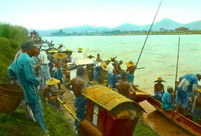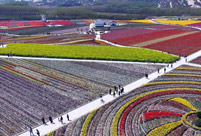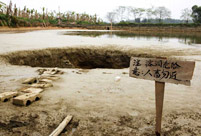

BEIJING, April 20 -- China is pushing for more restrictions on the business activities of officials' family members as pilots are trialed around the country.
The Central Leading Group for Deepening Overall Reform, headed by President Xi Jinping, will pilot regulating business operations of family members of officials in Beijing, Guangdong, Chongqing and Xinjiang, following a test in Shanghai.
Family members include officials' spouses, children and the children's spouses.
In China ,officials are banned from running private businesses. Their family members are not completely subject to the ban but are required to separate interests from places and industries within their jurisdiction in business operation.
But such tolerance seems to be vanishing with the deepening of the nation's anti-graft campaign.
Shanghai issued the country's first trial regulation to ban close family members of senior officials from running businesses last May.
According to the regulation released by the Communist Party of China (CPC) Shanghai committee, spouses of the city's officials at or above mayor level are not allowed to run companies, nor can their children or the spouses of their children do business in the city.
These officials must report business activities of their spouses and children to upper authorities, the regulation said, warning of punishment for concealment.
Those whose families are already engaged in business face two choices: ask their families to quit or they can resign themselves.
The city checked the job background of 1,802 officials' families and found violations related to 182 officials, according to Han Zheng, Party chief of Shanghai. Most of the officials' families chose to quit their business, while three officials were investigated for suspected corruption, Han was quoted as saying.
It is unknown whether or not the new pilot regions will implement the same regulation as Shanghai, but experts said measures are likely to be similar.
The fast expansion of the trial system indicates it has produced good effects in Shanghai, thus the terms and rules are possibly based on Shanghai's regulation, said Zhu Lijia, professor from the Chinese Academy of Governance. He said the regulation is explicit and has strong feasibility.
He expects that a national regulation will eventually be in place.
RAMPANT FAMILY-CORRUPTION
Corruption linked to families is one of the primary methods and the situation is severe, Zhu said.
Last year, the CPC's disciplinary agency released 34 violations from more than 34 officials at minister level, about one third of them were related to illegal participation of their families' commercial operations, the Beijing Times reported Tuesday.
Despite the business ban, some officials have made family members their agents in setting up companies. Many also abused power to help the bloom of their family members' business, conducting money-power trade.
In the graft case of former senior official Zhou Yongkang, who was sentenced to life imprisonment last June, he was accused of abusing power to help his families and friends do business and gain "huge amount of profits."
Former senior political advisor Ling Jihua, who was expelled from the CPC and put under investigation, was accused of "accepting others' money and belongings personally and through his wife, and sought benefits for his wife's businesses."
While addressing a meeting of county-level Party chiefs in January 2015, President Xi asked them to "forget any aspirations of becoming rich" if they want to serve as an official.
For Professor Peng Bo, a public affair expert at Shanghai Jiao Tong University, the trial system is a key step in promoting a systematic anti-corruption program, which also demonstrates the central authorities' resolution in "strictly governing the Party."
With the advancement of the anti-graft battle, the CPC has strengthened disciplining its 87 million party members in a stricter manner to maintain image and vitality.
The central authorities revised two regulations on clean governance and penalties for discipline violations, upholding the principle that the Party's discipline must be stricter than the law.
"Basically speaking, the restrictions over the business operations of official families is to further restrain the public power and avoid abuse of power," said Zhu.
To curb the corruption, he added, the illicit business running of officials and their families must be stopped.
Zhu said the assets of officials should gradually be publicized, and relevant financial information of their family members should also be made transparent to the public.
 The evolution of J-10 fighter
The evolution of J-10 fighter Top 10 Asian beauties in 2016
Top 10 Asian beauties in 2016 What's happening in Xisha Islands?
What's happening in Xisha Islands? When female soldiers meet flowers
When female soldiers meet flowers North Sea Fleet conducts drill in West Pacific Ocean
North Sea Fleet conducts drill in West Pacific Ocean Old photos record the change of Sichuan over a century
Old photos record the change of Sichuan over a century Breathtaking aerial photos of tulip blossoms in C China
Breathtaking aerial photos of tulip blossoms in C China Horrific: Pit swallows 25 tons of fish overnight
Horrific: Pit swallows 25 tons of fish overnight Vietnamese Su-30 fighters fly over Nanwei Island in South China Sea
Vietnamese Su-30 fighters fly over Nanwei Island in South China Sea Top 20 hottest women in the world in 2014
Top 20 hottest women in the world in 2014 Top 10 hardest languages to learn
Top 10 hardest languages to learn 10 Chinese female stars with most beautiful faces
10 Chinese female stars with most beautiful faces China’s Top 10 Unique Bridges, Highways and Roads
China’s Top 10 Unique Bridges, Highways and Roads High-profile cases of child abuse are just the tip of the iceberg expert
High-profile cases of child abuse are just the tip of the iceberg expert Film watchdog orders online celebrity’s videos removed for vulgarity
Film watchdog orders online celebrity’s videos removed for vulgarity Narrow-minded opposition against Twitter appointment
Narrow-minded opposition against Twitter appointment Celebrity kids should be kept out of spotlight
Celebrity kids should be kept out of spotlightDay|Week